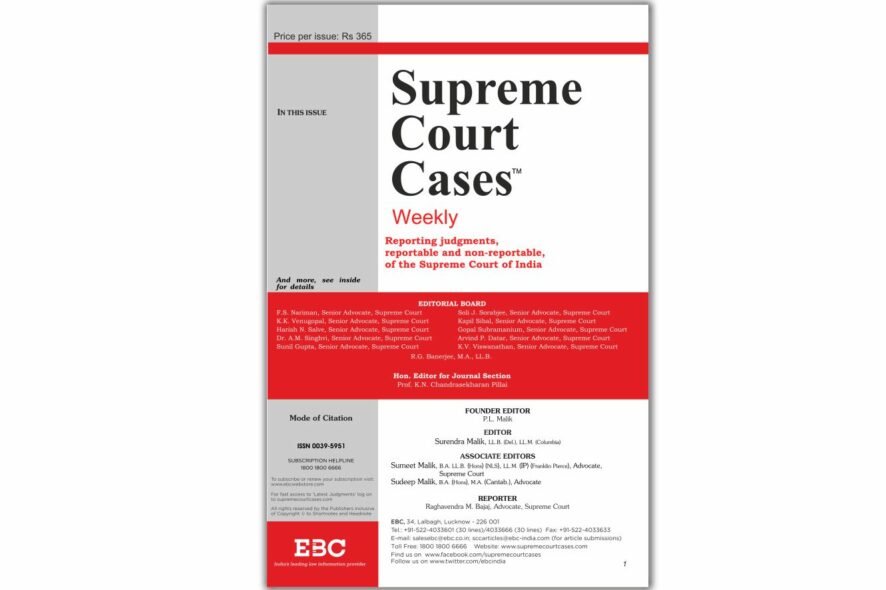Criminal Procedure Code, 1973 — S. 156(3) and Ss. 200 to 204 and S. 438: Power of Magistrate under S. 156(3) to direct investigation is independent of power to take cognizance and issue process under Ss. 200 to 204, as direction under S. 156(3) does not amount to taking of cognizance. Hence, there is no requirement of Magistrate to examine complainant on oath (as required under S. 200) before issuing direction under S. 156(3). [Supreme Bhiwandi Wada Manor Infrastructure (P) Ltd. v. State of Maharashtra, (2021) 8 SCC 753]
Criminal Procedure Code, 1973 — S. 197 — Previous sanction for prosecution of public servant: S. 197 CrPC seeks to protect officer from unnecessary harassment, who is accused of offence committed while acting or purporting to act in discharge of his official duties and, thus, prohibits court from taking cognizance of such offence except with previous sanction of competent authority. At the same time, such shield cannot protect corrupt officers and provisions must be construed in such manner as to advance cause of honesty, justice and good governance. Alleged indulgence of officers in cheating, fabrication of records or misappropriation cannot be said to be in discharge of their official duty. Yardstick to be adopted is to form prima facie view whether act or omission for which accused was charged had a reasonable connection with discharge of his duties. Real question, therefore, is whether act committed is directly concerned with official duty. [Indra Devi v. State of Rajasthan, (2021) 8 SCC 768]
Insecticides Act, 1968 — Ss. 3(k)(i), 17, 18, 24, 29 and 33 — Misbranding of insecticide — Complaint whether barred by limitation: Commencement of limitation period from date of first analysis report cannot be extended merely because subsequent analysis report was being sought. [Cheminova (India) Ltd. v. State of Punjab, (2021) 8 SCC 818]
Service Law — Pay — Revision of pay — Entitlement to, if any — Factors to be considered when employer does decide to revise pay — Financial constraints of employer — Relevance of: Principles clarified re three broad sets of employers viz. (i) Employers in organised sector like industry; (ii) Employers in public sector undertakings including Boards and Corporations and other establishments which meet test of “State” within meaning of Art. 12 of the Constitution; and (iii) Central and State Governments proper as employers. As far as first category is concerned there are numerous complex factors, some of which are economic like financial status of employer, national economy, etc. while some spring from social philosophy which acknowledges that worker’s wage is force of collective bargaining under Labour laws and wage structure must be tested on anvil of social justice. In respect of establishments which meet parameters of being “State” within meaning of Art. 12 of the Constitution, reiterated that non-revision of pay scale does not violate fundamental rights guaranteed under Art. 21 of the Constitution since under Labour law workman is only entitled to minimum or fair wage and not periodic revision. Besides, economic viability is an important consideration while determining wage structure, and pay revision cannot be claimed when employer is making continuous losses. As far as Central and State Government as employers is concerned, financial and economic implications are very relevant and germane to any policy decision touching administration of Government. Punjab State Coop. [Milk Producers Federation Ltd. v. Balbir Kumar Walia, (2021) 8 SCC 784]
Service Law — Police — Appointment — Antecedents/Character — Involvement in offence(s) involving moral turpitude/violent activities: Determination of entitlement to appointment in case of offences involving moral turpitude, violent activities would depend on nature of offence charged with and result of same. Mere acquittal not sufficient but rather entitlement would depend on whether it was clean acquittal based on total absence of evidence. If acquittal is recorded in a case involving moral turpitude or offence of heinous/serious nature, on technical ground and it is not a case of clean acquittal or honourable acquittal, or benefit of reasonable doubt has been given, the employer may consider all relevant facts available as to antecedents, and may take appropriate decision as to entitlement to appointment. [State of Rajasthan v. Love Kush Meena, (2021) 8 SCC 774]
Service Law — Police — Appointment — Antecedents/Character: In this case, cancellation of appointment due to absence of honourable acquittal from crime of violence, held, justified. [State of Rajasthan v. Mohd. Saleem, (2021) 8 SCC 782]







